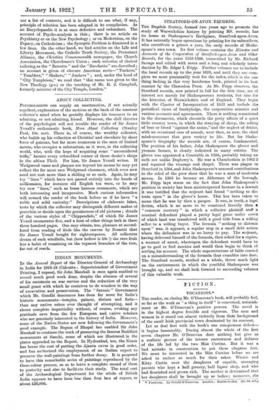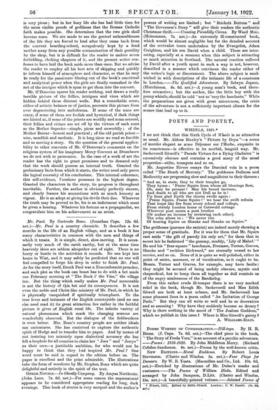FICTION.
VOCATIONS.*
THE reader, on closing Mr. O'Donovan's book, will probably feel, so far as the work as " a thing in itself " is concerned, astonish. ment at Mr. O'Donovan's positive powers. The novel is in the highest degree forcible and vigorous. The men and women in it stand out almost violently from their background of the small Irish provincial town dominated by its convent.
Let us deal first with the book's one conspicuous defect-- it begins lamentably. During almost the whole of the- first seven chapters Mr. O'Donovan does nothing but give us a realistic picture of the intense narrowness and dullness of the life led by the two Miss Curtin. But it was a bad mistake in construction to put these chapters first. We must be interested in the Miss Carting before we are asked to endure so much for their sakes. Winnie and Kitty Curtin were the daughters of capable, managing parents who kept a half grocery, half liquor shop, and who had flourished and grown rich. The mother is determined that her daughters shall be brought up as ladies ; moreover, she
• Vocation. By Gerald O'Donovan. London : Martin Seeker. lea. ed. net.]
is very pious"; but in her busy life she has had little time for the more visible proofs of godliness that the Roman Catholic faith makes possible. She determines that the two girls shall become nuns. We are made to see the genteel unbearableness of the life they are forced to lead after they came back from the convent boarding-school, scrupulously kept by a. fond mother away from any possible contamination of their gentility by the shop, but it is difficult for the reader to endure seven forbidding, choking chapters of it, and the present writer con- fesseS to have laid the book aside more than once. But we advise the reader to employ all his best arts of skipping and quickly to inform himself of atmosphere and character, so that he may be ready for the passionate blitzing out of the book's emotional and analytical power when the girls are finally enmeshed in the net of the intrigue which is Spun to get thorn into the convent.
Mr. O'Donovan spares his reader nothing, and draws a really terrible picture of the follies, intrigues and vices which are hidden behind those discreet walls. But a remarkable sense, either of artistic balance or of justice, prevents this picture from ever degenerating into melodrama. If some of the nuns are crazy, if some of them are foolish and hysterical, if dark things are hinted at, if some of the priests are worldly and some sensual, their follies and crimes are set off by the virtues of such nuns as the Mother Superior—simple, pious and unworldly ; of the Mother Bursar—honest and practical ; of the old parish priest— wise, unselfish and sardonic. It is long since we read so forcible and so moving a story. On the question of the general applica- bility to other convents of Mr. O'Donovan's comments on the religious system of his imaginary Mercy Convent at Drumbawn we do not wish to pronounce. In the case of a work of art the reader has the right to grant premisses and to demand only that the work should possess an internal truth. Granted the preliminary facts from which it starts, the writer need only prove the logical necessity of his conclusions. This internal coherence, this self-evidence, Vocations possesses in the highest degree. Granted the characters in the story, its progress is throughout inevitable. Further, the author is obviously perfectly sincere, and clearly frames his accusations with as much honesty as vigour. He is an adept at giving his devils their due. Wherever the truth may be proved to lie, his is an indictment which must be given a hearing. Whatever his fortune as a-propagandist, we congratulate him on his achievement as an artist.



































 Previous page
Previous page